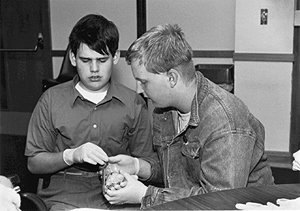World of Radio, an Option for the Visually Impaired

There are a couple of things a visually impaired person could do in the world of radio. They could be an amateur operator or get internships in a radio station. The adaptations for both are quite easy. Amateur radio is a fun thing to do during spare time. One of the requirements of amateur radio is getting a license. The privileges you get depend on the class of license you have. I currently hold technician class. This is one that allows people to talk in the VHF (very high frequency) and UHF (ultra high frequency).
To get the required information to help me pass the test, I signed up with an organization called Courage Center. This is an organization that provides adaptations for disabled people. They also send out monthly newsletters about what new things take place there. I listened to their recording and had assistance from the Rogue Valley Amateur Radio club in taking the test. I passed it the first time and my license came in June, 1993. Currently, I am working to upgrade it.
I am upgrading to general class which will allow me to work the world on the shortwave bands. One way that disabled people can use their computers for this form of communication is dialing into an amateur radio bulletin board system. On these systems, people all over the world call and communicate with other operators.
Not only have I had experience in 2-way radios, but I have also had a couple of internships in radio stations. I acquired these internships through the Oregon Commission for the Blind. I used them as my career during the summer work experience program which is held annually every summer. I lived in a college dormitory and used public transportation to get around. My first internship was in 1993 when I was working for public broadcasting. Public broadcasting gave me a lot of the experience I needed. I gave weather observations over the air and did reception work. To give weather observations, I had someone tell the information to me and I brailled it out. The microphone was set up for me in the studio and I just adjusted it so it was level with my mouth and talked into it.
My second career was in Community Radio which is highly listener-supported. This one did not go well because they did not keep me very busy. Even when I was working, I was doing things like labeling tapes and CD's which did not give me the radio training I needed. There was also too much dead time. In the end, it was decided that Community Radio was not the place for me to work.
In conclusion, I would like to state that there is something in the world of radio for people with visual impairments and other disabilities. Look around for radio stations that might want interns. Check around for information on amateur radio if you are interested. I am sure you will find it exciting. For further information send electronic mail to ericp@u.washington.edu.